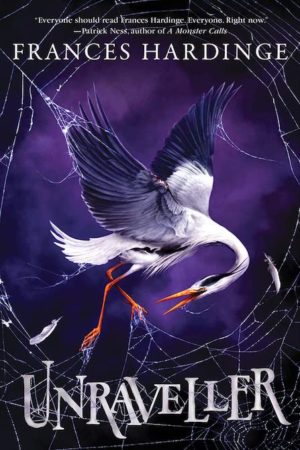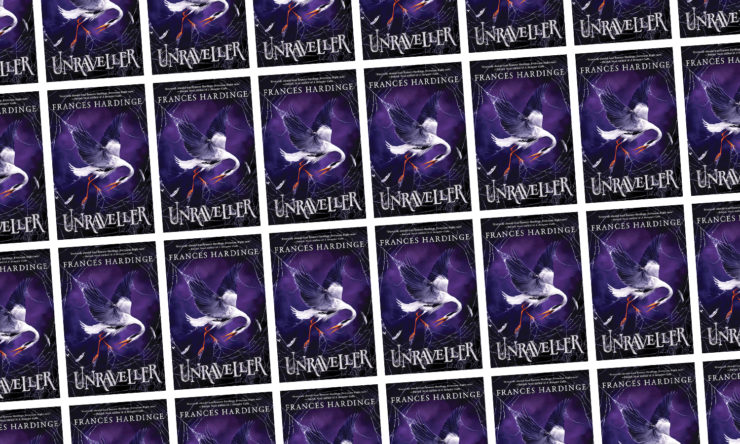There is nothing quite like entering a Frances Hardinge world, and the country in which she sets her latest novel, Unraveller, is no exception. “If you must travel to the country of Raddith, then be prepared,” she begins. “Bring a mosquito net for the lowlands and a warm coat for the hills or mountains. If you mean to visit the misty marshlands known as the Wilds, you will need some stout, waterproof boots. (You will also need wits, courage, and luck, but some things cannot be packed.”
Wits, courage, and luck: Well, our main characters have at least one of those, at least sometimes. Unraveller is the story of a girl who used to be a heron, a boy who can unravel curses, and a country in which people’s anger can be truly transformative. It is both rolllicking adventure and contemplative consideration of when and how anger has its uses—and how it can be misused.
The Wilds, which run along the coast of Raddith, are a place of mystery and magic and legend, home to beings like marsh horses and Dancing Stars and, most importantly, Little Brothers, which are kind of like spiders, except not really. They weave and they have many legs, but they can also give people the power to curse others. “The curse then nestles in the host’s soul like an unhatched egg, growing in power, until the curser is ready to unleash it upon an enemy.”
Once upon a time, Kellen encountered a Little Brother. What happened then—a formative moment that saw him gently but firmly sent out of his town of weavers— was not his fault, but it did leave Kellen with an unusual skill. He can unravel things, from clothes (his own, if he’s not wearing iron-lined gloves) to curses. Unraveling a curse is no simple task. Kellen can’t just do it; he has to understand the curse. It takes time, which he has, and patience, which he lacks.
Buy the Book


Unraveller
Once upon a time, he lifted a curse from a family of children who’d been turned into birds. One of them refused, remaining a gull. One did something terrible and has not recovered. And one is Nettle, who spent three years as a heron and is now Kellan’s shadow. Her past haunts her, and being human is unfamiliar and uncomfortable, but she is dogged and patient and watchful, and Kellen would not be as good at his work without her.
Unraveller’s first third or so is taken up with a quest that Kellen and Nettle have almost no choice but to accept. Someone is freeing cursers, and a man named Gale and his terrifying marsh horse enlist Kellen for his skills. Where he goes, Nettle goes. But this is only half the story. Who is freeing cursers is not the right question. Why is much more important. The action is only a symptom, an indication that something is not right in Raddith.
In a 2013 interview, Hardinge said, “My settings aren’t real to me unless they have a history.” And Raddith’s history is key. The truce between nation and Wilds is uneasy, a careful balance between known and unknown, with those along the border most adaptable to either. Kellen and Nettle’s journey eventually takes them into the Wilds, and into the company of cursers and cursed, of lonely husbands and wives who need to escape; of once-friends and the kind of leaders who want to use others’ pain for their own ends.
When I wrote about Hardinge’s A Face Like Glass, I noted that her villains are rarely people, but broken societies that have stopped asking whether they can be fixed. Raddith is a society that largely doesn’t realize how broken it is. Her young protagonists are outcasts of a sort, but not the same kind of outcast as a curser. It is easy to assume, when you are young and naive or sheltered or have spent some time as a bird, that people who have been rejected by society have been treated this way for valid reasons.
Discovering the flaws in one’s society (large or small, country or village) is a huge and important part of growing up, and one that Hardinge explores and pokes at with questions and ideas. If anyone can do something wrong, or feel something wrong, and wind up an outcast, then what? What grace can the world learn to offer to the rejected and outcast and othered? What can be learned from anger, and what are its limitations? How do you know when anger is righteous and useful, and when it’s merely cruel? Can power that comes from anger and pain be used for good?
Like so many Hardinge characters, Kellen and Nettle are primarily focused on survival; it’s the arrival of Gale, with his marsh horse and mysterious employer, that sets them on a different kind of adventure—one that asks very Hardinge-y questions about freedom and justice and wisdom and rage. Kellen is the title character, but Nettle is his equal, and Hardinge is very clear in how both their skillsets are valued, both their flaws painful and real. He acts and she observes, until a time comes that Nettle, too, has to act—because she’s learned so very much by watching, and by beginning to understand her human self again.
Unraveller pulls from fairy tales about transformed brothers, real-world conflicts between weavers, stories about spiders and weaving, and a whole host of tidbits of myth and legend, all of which are woven neatly into the fabric of Raddith’s history. The marsh horse is not entirely unlike a kelpie. The mysterious and capricious inhumans in magical boats, with their midnight markets and slippery deals, are not unlike any number of kinds of fae, rendered in Hardinge’s own specific style.
“When you’re a curser,” one character says, late in the book, “at least you matter. Your feelings smash a hole in the world.” There’s incredible grace and skill in the way Hardinge untangles the idea of feelings made manifest—and of how two teenagers come to understand that nothing, not rage or anger or love or cursers or family—is inherently good or bad. The way her characters grow reminds me, a little, of some other prickly, troubled young protagonists: Kristin Cashore’s Hava, or Rachel Hartman’s Tess. All of them have been hurt by the world; all of them, in facing their pain, find they have much more to give than they expected.
Everything echoes down the webs. Even magical creatures have a thing or two to learn about human emotions. And even a carefully organized society can learn that it needs to change.
Unraveller is published by Amulet Books.
Read an excerpt here.
Molly Templeton lives and writes in Oregon, and spends as much time as possible in the woods. Sometimes she talks about books on Twitter.










